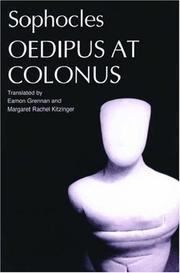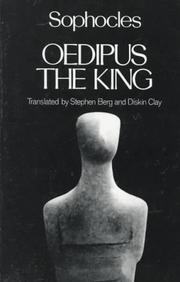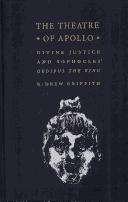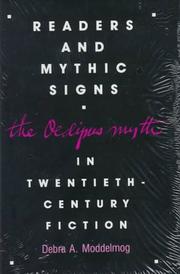| Listing 1 - 10 of 20 | << page >> |
Sort by
|

ISBN: 1280530936 019803086X 1423784804 9781423784807 9780198030867 9780195135046 0195135040 9780195135040 0197705197 9781280530937 Year: 2005 Publisher: New York Oxford University Press
Abstract | Keywords | Export | Availability | Bookmark
 Loading...
Loading...Choose an application
- Reference Manager
- EndNote
- RefWorks (Direct export to RefWorks)
'Oedipus at Colonus' is Sophocles' last play, written at the end of the golden age of Athenian culture, and it tells the story of Oedipus' last day of life. This edition contains interpretive and explanatory notes and an introduction for the nonspecialist reader.
Mythology, Greek --- Oedipus --- Edip --- Edipas --- Edipi --- Edipo --- Edips --- Edipu --- Edipus --- Edyp --- Ødipus --- Oedip --- Œdipe --- Oidipus --- Oidipusz --- أوديب --- Эдип --- Эдып --- Едіп --- Едип --- Οἰδίπους --- Οιδιποδας --- 오이디푸스 --- オイディプース --- 俄狄浦斯 --- עדיפוס --- אדיפוס --- Oedipus (Greek mythology)
Book
ISBN: 0299282538 9780299282530 9780299282547 0299282546 Year: 2011 Publisher: Madison, Wis. University of Wisconsin Press
Abstract | Keywords | Export | Availability | Bookmark
 Loading...
Loading...Choose an application
- Reference Manager
- EndNote
- RefWorks (Direct export to RefWorks)
David Mulroyrsquo;s brilliant verse translation ofOedipus Rexrecaptures the aesthetic power of Sophoclesrsquo; masterpiece while also achieving a highly accurate translation in clear, contemporary English.
Oedipus --- Edip --- Edipas --- Edipi --- Edipo --- Edips --- Edipu --- Edipus --- Edyp --- Ødipus --- Oedip --- Œdipe --- Oidipus --- Oidipusz --- أوديب --- Эдип --- Эдып --- Едіп --- Едип --- Οἰδίπους --- Οιδιποδας --- 오이디푸스 --- オイディプース --- 俄狄浦斯 --- עדיפוס --- אדיפוס --- Oedipus (Greek mythology)

ISBN: 1283097915 9786613097910 0199769818 9780199769810 0195054938 9780195054934 9780195054934 0195054938 9781283097918 6613097918 0199840369 9780199840366 Year: 1988 Publisher: New York Oxford University Press
Abstract | Keywords | Export | Availability | Bookmark
 Loading...
Loading...Choose an application
- Reference Manager
- EndNote
- RefWorks (Direct export to RefWorks)
Based on the conviction that only translators who write poetry themselves can properly recreate the celebrated and timeless tragedies of Aeschylus, Sophocles, and Euripides, the Greek Tragedy in New Translations series offers new translations that go beyond the literal meaning of the Greek in order to evoke the sense of poetry evident in the originals. Under the editorship of Peter Burian and Alan Shaprio, each volume includes a critical introduction, commentary on difficult passages, ample stage directions, and a glossary of the mythical names and geographical references encountered in the di
Mythology, Greek. --- Greek mythology --- Oedipus --- Edip --- Edipas --- Edipi --- Edipo --- Edips --- Edipu --- Edipus --- Edyp --- Ødipus --- Oedip --- Œdipe --- Oidipus --- Oidipusz --- أوديب --- Эдип --- Эдып --- Едіп --- Едип --- Οἰδίπους --- Οιδιποδας --- 오이디푸스 --- オイディプース --- 俄狄浦斯 --- עדיפוס --- אדיפוס --- Oedipus (Greek mythology)
Book
ISBN: 9780299302542 9780299302535 0299302539 0299302547 Year: 2014 Publisher: Madison, Wisconsin
Abstract | Keywords | Export | Availability | Bookmark
 Loading...
Loading...Choose an application
- Reference Manager
- EndNote
- RefWorks (Direct export to RefWorks)
Oedipus at Colonus is the third in Sophocles' trilogy of plays about the famous king of Thebes and his unhappy family. It dramatizes the mysterious death of Oedipus, by which he is transformed into an immortal hero protecting Athens. This was Sophocles' final play, written in his mid-eighties and produced posthumously. Translator David Mulroy's introduction and notes deepen the reader's understanding of Oedipus' character and the real political tumult that was shaking Athens at the time that Sophocles wrote the play. Oedipus at Colonus is at once a complex study of a tragic character, an indictment of Athenian democracy, and a subtle endorsement of hope for personal immortality. As in his previous translations of Oedipus Rex and Antigone, Mulroy combines scrupulous scholarship and textual accuracy with a fresh poetic style. He uses iambic pentameter for spoken passages and short rhymed stanzas for choral songs, resulting in a text that is accessible and fun to read and perform.
Classical Greek literature --- Oedipus --- Edip --- Edipas --- Edipi --- Edipo --- Edips --- Edipu --- Edipus --- Edyp --- Ødipus --- Oedip --- Œdipe --- Oidipus --- Oidipusz --- أوديب --- Эдип --- Эдып --- Едіп --- Едип --- Οἰδίπους --- Οιδιποδας --- 오이디푸스 --- オイディプース --- 俄狄浦斯 --- עדיפוס --- אדיפוס
Book
ISBN: 8484271781 9788484271789 Year: 2002 Publisher: Cuenca : Ediciones de la Universidad de Castilla-La Mancha,
Abstract | Keywords | Export | Availability | Bookmark
 Loading...
Loading...Choose an application
- Reference Manager
- EndNote
- RefWorks (Direct export to RefWorks)
Edipo (Personaje mitológico) en la literatura. --- French literature --- French literature. --- Literatura francesa --- Literature. --- Mitología en la literatura. --- Mythology in literature. --- Mythology. --- Oedipus (Greek mythology). --- History and criticism. --- Crítica e interpretación. --- Oedipus, --- In literature.
Book
ISBN: 9783110447330 3110447339 9783110457322 3110457326 9783110456042 3110456044 Volume: 18 Publisher: De Gruyter.
Abstract | Keywords | Export | Availability | Bookmark
 Loading...
Loading...Choose an application
- Reference Manager
- EndNote
- RefWorks (Direct export to RefWorks)
The ancient scholia to Sophocles' Oedipus at Colonus shed light on Alexandrian ways of engaging with this play, and are richer than those to the other Sophoclean plays. The last editor, Vittorio de Marco (1952), established a better text of these scholia than his predecessors, in as much as he had a fuller knowledge of their manuscript tradition and a better understanding of their stratified nature. Still, his work is marred by a number of inaccuracies, omissions and methodological shortcomings. The new edition by Georgios Xenis improves on de Marco's work by a careful examination of all the sources of the text and the conjectures proposed by scholars, and by relying on a clearly defined methodological framework. In this edition the scholia to the Oedipus at Colonus are restored in a textual state that is arguably the earliest we can recover, and is free of contradictions, unacceptable repetitions, and hybridisation or blending of elements from different versions. The critical text is accompanied by a detailed apparatus criticus, and is contextualised in its ancient scholarly tradition by means of a rich array of passages drawn from comparable sources. Extensive indices are provided at the end of the volume. The edition will be an invaluable resource for those engaged in the interpretation of Sophocles' tragedies and, in particular, of the Oedipus at Colonus, and will be of interest to classicists working on ancient literary criticism and ancient scholarship.
Greek drama (Tragedy) --- Greek drama (Tragedy). --- History and criticism. --- Sophocles. --- Oedipus at Colonus (Sophocles). --- Oedipus at Colonus (Sophocles) --- Critical edition. --- Kritische Edition. --- Oedipus. --- Sophokles. --- Ödipus. --- Sophocles --- Sophocle --- Sófocles --- Sofoklis --- Sofokl --- Sūfūklīs --- Sofokles --- Sūtmūklīs --- Sofocle --- Sophokles --- Sofokŭl --- סופוקלס --- سوفوكليس --- Σοφοκλῆς --- Sophoclis --- Oedipus Coloneus (Sophocles) --- Edipo a Colono (Sophocles) --- Aedipus at Colonus (Sophocles)
Book
ISBN: 1472519728 147254014X 147251971X 9781472519719 0715637134 9780715637135 9781472519726 9781472540140 Year: 2009 Publisher: London Duckworth
Abstract | Keywords | Export | Availability | Bookmark
 Loading...
Loading...Choose an application
- Reference Manager
- EndNote
- RefWorks (Direct export to RefWorks)
"In his final play, Sophocles returns to the ever-popular character of Oedipus, the blind outcast of Thebes, the ultimate symbol of human reversal, whose fall he had so memorably treated in the 'Oedipus Tyrannus'. In this play, Sophocles brings the aged Oedipus to Athens, where he seeks succour and finds refuge, despite the threatening arrival of his kinsman Creon, who tries to tempt and then force the old man back under Theban control. Oedipus' resistance shows a fierceness in no way dimmed by incapacity, but he also refuses to aid his repentant son, Polyneices, in his coming attack on Thebes, manifesting once more the passion and harshness which mark his character so thoroughly. His mysterious death at the end of the play, witnessed only by Theseus himself, seems the sole fitting end for such an exceptional and problematic figure, transforming Oedipus into one of the 'powerful dead' whose beneficence towards Athens heralds a positive future for the city. This useful companion provides background, context, a synopsis and detailed analysis of the play."--Bloomsbury Publishing In his final play, Sophocles returns to the ever-popular character of Oedipus, the blind outcast of Thebes, the ultimate symbol of human reversal, whose fall he had so memorably treated in the 'Oedipus Tyrannus'. In this play, Sophocles brings the aged Oedipus to Athens, where he seeks succour and finds refuge, despite the threatening arrival of his kinsman Creon, who tries to tempt and then force the old man back under Theban control. Oedipus' resistance shows a fierceness in no way dimmed by incapacity, but he also refuses to aid his repentant son, Polyneices, in his coming attack on Thebes, manifesting once more the passion and harshness which mark his character so thoroughly. His mysterious death at the end of the play, witnessed only by Theseus himself, seems the sole fitting end for such an exceptional and problematic figure, transforming Oedipus into one of the 'powerful dead' whose beneficence towards Athens heralds a positive future for the city. This useful companion provides background, context, a synopsis and detailed analysis of the play
Sophocles. --- Oedipus --- Edip --- Edipas --- Edipi --- Edipo --- Edips --- Edipu --- Edipus --- Edyp --- Ødipus --- Oedip --- Œdipe --- Oidipus --- Oidipusz --- أوديب --- Эдип --- Эдып --- Едіп --- Едип --- Οἰδίπους --- Οιδιποδας --- 오이디푸스 --- オイディプース --- 俄狄浦斯 --- עדיפוס --- אדיפוס --- In literature. --- Oedipus (Tale) in literature. --- Sophocles --- Sophocle --- Sófocles --- Sofoklis --- Sofokl --- Sūfūklīs --- Sofokles --- Sūtmūklīs --- Sofocle --- Sophokles --- Sofokŭl --- סופוקלס --- سوفوكليس --- Σοφοκλῆς --- Sophoclis

ISBN: 0773515003 9786612854187 1282854186 0773566279 9780773566279 9780773515000 9781282854185 Year: 1996 Publisher: Montreal : McGill-Queen's University press,
Abstract | Keywords | Export | Availability | Bookmark
 Loading...
Loading...Choose an application
- Reference Manager
- EndNote
- RefWorks (Direct export to RefWorks)
By imaginatively recreating the play's original staging and debunking the interpretations of various critics, including Aristotle, Ulrich von Wilamowitz-Moellendorff, E.R. Dodds, Frederick Ahl, and John Peradotto, Griffith shows that Apollo is a constant, powerful presence throughout the play. He contends that although we can sympathize with Oedipus because of his sufferings, he is still morally responsible for murdering his father and sleeping with his mother. Apollo is therefore not indifferent and his actions are not unjust. Griffith focuses on Apollo's commandment "know thyself," a commandment Oedipus belatedly and tragically fulfils, to stress both the need for self-understanding in the study of ancient literature and the usefulness of ancient literature in achieving self-understanding.
Apollo (Greek deity) in literature. --- Justice in literature. --- Oedipus (Greek mythology) in literature. --- Sophocles. --- Sophocles --- Sofokles --- Sophocle --- Sofocle --- Sophokles --- Sofocles --- Oedipus --- Apollo --- Apollōn --- Apellōn --- Απολλων --- Απελλων --- Helios --- Edip --- Edipas --- Edipi --- Edipo --- Edips --- Edipu --- Edipus --- Edyp --- Ødipus --- Oedip --- Œdipe --- Oidipus --- Oidipusz --- أوديب --- Эдип --- Эдып --- Едіп --- Едип --- Οἰδίπους --- Οιδιποδας --- 오이디푸스 --- オイディプース --- 俄狄浦斯 --- עדיפוס --- אדיפוס --- In literature. --- Sófocles --- Sofoklis --- Sofokl --- Sūfūklīs --- Sūtmūklīs --- Sofokŭl --- סופוקלס --- سوفوكليس --- Σοφοκλῆς --- Sophoclis
Book
ISBN: 3736417845 1986570649 Year: 2016 Publisher: [Place of publication not identified] : Anboco,
Abstract | Keywords | Export | Availability | Bookmark
 Loading...
Loading...Choose an application
- Reference Manager
- EndNote
- RefWorks (Direct export to RefWorks)
Sophocles --- Oedipus --- Antigone --- Antígona --- Antygona --- 安提戈涅 --- アンティゴネー --- אנטיגונה --- 안티고네 --- Антигона --- Антыгона --- Антігона --- أنتيجون --- Ἀντιγόνη --- Edip --- Edipas --- Edipi --- Edipo --- Edips --- Edipu --- Edipus --- Edyp --- Ødipus --- Oedip --- Œdipe --- Oidipus --- Oidipusz --- أوديب --- Эдип --- Эдып --- Едіп --- Едип --- Οἰδίπους --- Οιδιποδας --- 오이디푸스 --- オイディプース --- 俄狄浦斯 --- עדיפוס --- אדיפוס --- Sofokles --- Sophocle --- Sofocle --- Sophokles --- Sofocles --- Sófocles --- Sofoklis --- Sofokl --- Sūfūklīs --- Sūtmūklīs --- Sofokŭl --- סופוקלס --- سوفوكليس --- Σοφοκλῆς --- Sophoclis

ISBN: 0585135452 9780585135458 0809318466 9780809318469 Year: 1993 Publisher: Carbondale Southern Illinois University Press
Abstract | Keywords | Export | Availability | Bookmark
 Loading...
Loading...Choose an application
- Reference Manager
- EndNote
- RefWorks (Direct export to RefWorks)
Some literary scholars view myth criticism as passe; an approach to literature that enjoyed a heyday in the l950s and 1960s before being replaced by approaches that are considered to be more theoretically sophisticated and satisfying, such as feminism, new historicism, and deconstruction. Moddelmog argues that there are many good reasons not to cast out myth criticism from the community of critical approaches. Most obvious among them is that myth has attracted many writers of this century -- from James Joyce to Thomas Pynchon, Virginia Woolf to Flannery OʹConnor, Thomas Mann to Alain Robbe-Grillet, William Faulkner to Alberto Moravia -- and that to ignore myth is to dismiss an essential part of their work. Moddelmog suggests that by reconstruing the relationship between myth and literature, we will find that mythic approaches are frequently not only necessary but also highly stimulating, engaging readers in many varieties of questions, quests, and conclusions. -- Publisher description.
Fiction --- Reader-response criticism. --- Mythology --- Psychoanalysis and literature. --- Reader-response criticism --- Psychoanalysis and literature --- Literature - General --- Languages & Literatures --- Literature and psychoanalysis --- Psychoanalytic literary criticism --- Literature --- Myths --- Legends --- Religion --- Religions --- Folklore --- Gods --- Myth --- Reader-oriented criticism --- Reception aesthetics --- Criticism --- Reading --- History and criticism. --- Psychological aspects. --- History and criticism --- Psychological aspects --- Oedipus --- Edip --- Edipas --- Edipi --- Edipo --- Edips --- Edipu --- Edipus --- Edyp --- Ødipus --- Oedip --- Œdipe --- Oidipus --- Oidipusz --- أوديب --- Эдип --- Эдып --- Едіп --- Едип --- Οἰδίπους --- Οιδιποδας --- 오이디푸스 --- オイディプース --- 俄狄浦斯 --- עדיפוס --- אדיפוס --- In literature. --- Mythology.
| Listing 1 - 10 of 20 | << page >> |
Sort by
|

 Search
Search Feedback
Feedback About UniCat
About UniCat  Help
Help News
News